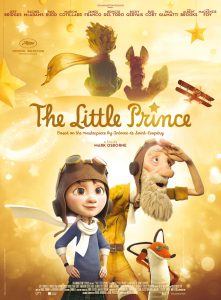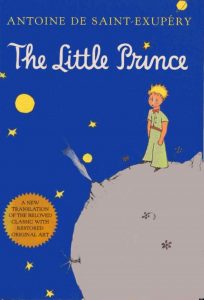Mia Daniele//Blog Writer
Very rarely is there a movie adaptation of a book where the story is replicated perfectly, where none of the devoted fans of the source materials can find any fault with the work presented to them on the silver screen. Rarer is it where the movie stands less as a faithful adaptation and more of a tribute to a story that is a basis of many people’s childhoods.

The Little Prince (2015)
The Little Prince premiered last year all over the world, though for American audiences, it can readily be found for streaming on Netflix. Directed by Mark Osborne, the animated movie tells less a story about a little prince who travels through the stars and more about a little girl who hears of his tale for the first time. Instead of starting out with a pilot who crashes in the desert, we start with a girl who wants to be adult and who dreams of getting into a prestigious school so that her future will be set. It is only when the kooky neighbor starts sharing his drawings of an incident that happened to him when he was a young man does the tale of the little prince finally get told. However, the movie maintains a focus on the little girl learning to value her childhood through the journey of the little prince.
While the choice to focus the story on her seems odd at first, there is almost a level of artistic genius that is can be gleaned from it once one acknowledges the source material, Antoine de Saint-Exupéry’s book. It’s thin, written with the least amount of words possible. When it was first published in 1943, critics didn’t know what to make of it. Some say that it was too childish for any adult to appreciate. Some critics said that the analogies and the lessons contained within were so adult that it simply was not made for children.
In the movie, the story is looked at through the eyes of an adult and a child. What the little girl finds in the story of the little prince is much different than what her neighbor finds. The dual interpretation gives a life to the tale that a straightforward adaptation could not achieve. It was once described to me that the movie was less of a from-page-to-screen product, but more of a love letter. It’s very obvious that Osborne loves the story of the little prince as much as his audience does. He gives us this movie not to say that he knows what the author’s intentions were, but to offer his idea of what it all means.
I watched the movie long before I read the book. In fact, it was the movie that made me interested in the novel to begin with. Each version of the story was profound in its own way. The lesson the little girl learns at the end of the movie was unexpected but welcoming. When the Netflix logo appeared at the end of the credits, I felt that l finally had the secret to being able to let go of childhood and to set into adulthood. Every time a friend tells me about their anxieties of stepping into the real world, I tell them to watch the movie. It wrecks you, drags you to tears, but it fills a hole in you that you never knew you had.

by Antoine de Saint-Exupéry
I read the book six months later, consequently while riding a plane. When I read the last line, I felt empty under my skin, as if I had lost something. The ending wasn’t comforting. It was cold and mysterious, confronting me with emotions that, as an adult, I still didn’t know how to handle.
The movie is an interpretation of the book, a lit candle placed in honor of a story that knows childhood better than anyone. Look at them both and decide for yourself what the story of the little prince means to you.

2 comments for “The Little Prince: Book vs. Movie”